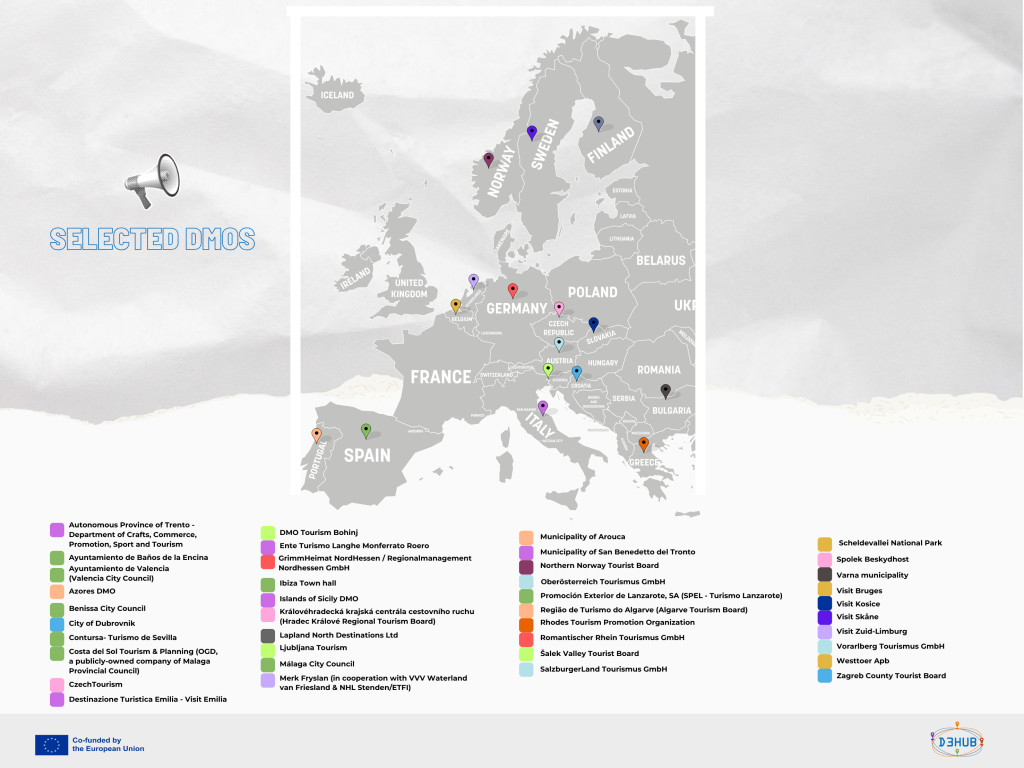By Jedrt Mikelj, Arctur
Tourism is transforming. As global travel recovers and evolves, destinations must adapt to the challenges and opportunities of a rapidly changing world. The recently concluded Call for Destination Management Organizations (DMOs) under the Data-Driven Destinations Hub, D3HUB initiative marks a significant step forward. This program is designed to help destinations harness the power of data to create sustainable, inclusive, and resilient tourism models.
The response to this initiative was nothing short of inspiring. A total of 80 DMOs from 15 European Union countries and two non-EU countries answered the Call. Their collective enthusiasm reflects the growing recognition of data’s potential to transform tourism management and enhance the visitor experience.
A Snapshot of Participation
With 23 DMO applications from Spain, followed by Italy with 12, and Belgium, Czechia, and Slovenia featuring prominently, the variety of the applications was achieved. This widespread participation highlights the relevance of the program across a diverse array of destinations, each bringing unique challenges and opportunities to the table.
The destinations represent a tapestry of landscapes, each telling its own story. Mixed landscapes, combining urban and natural elements led the way with 29 submissions. Urban areas accounted for 15 applications, while 14 came from coastal destinations. Rural areas, nature-focused spots, and even snowy mountain regions were also well-represented.
Empowering Local and Regional Voices
The Call’s inclusivity is further reflected in the types of organizations that applied. Most of the submissions, 45 in total, came from local DMOs. Regional DMOs contributed another 32 applications, highlighting the importance of collaboration at the regional level. The involvement of two national DMOs and three additional organizations from other categories rounded out the list, showing a wide spectrum of participation across administrative levels.
Tourism Employment: A Measure of Impact
Tourism isn’t just about travel, it’s a lifeline for many communities. This was evident in the data shared by applicants, with nearly a third of destinations reporting that more than 15% of their workforce depends on tourism. Another 16 destinations revealed that tourism employment represents 10-15% of their local economy. These figures are a testament to the sector’s critical role in creating jobs and sustaining livelihoods, particularly in areas where other industries may not have as much presence.
Tackling Challenges with Data-Driven Solutions
The Call also provided a platform for destinations to outline the challenges they face and the innovative solutions they are pursuing. A common theme was the need to balance the interests of visitors and residents, ensuring that tourism enhances rather than disrupts local communities.
Another recurring issue was the uneven distribution of tourists, with some areas struggling with overcrowding while others remain under-visited. Climate change also featured prominently, with several destinations emphasizing the need for sustainable practices and resilience strategies.
It’s encouraging to note that 56 of the 80 applicants have institutional support for their participation in the Call, a key factor for implementing effective and lasting change.
Spotlight on Selected Destinations
Due to the large interest, the number of selected destinations has been increased from 30 to 40. They will be divided into four different clusters: management of tourist flows, climate change, residents and visitors balance and emerging destinations.
All together, Among the standout destinations selected for the program are 40 places. Varna Municipality in Bulgaria, with its rich history and stunning Black Sea coastline, exemplifies the potential of blending cultural heritage with modern tourism practices. Rhodes in Greece, famous for its ancient sites and crystal-clear waters, is striving to integrate sustainability into its tourism model.
Meanwhile, Bruges in Belgium, with its picturesque medieval architecture, is working to preserve its heritage while balancing the demands of a growing visitor base.
These destinations, along with 37 others, are now poised to lead the way in adopting data-driven methodologies. Their experiences will not only benefit their local communities but also serve as a blueprint for other destinations around Europe and above.

Shaping the Future of Tourism Together
By bringing together a diverse group of destinations and fostering collaboration, the Tourism of Tomorrow initiative is paving the way for a new era in tourism. One where data isn’t just collected but actively used to create better experiences for visitors, healthier communities for residents, and a more sustainable planet for future generations.
As these destinations begin their journey, they carry with them the hopes and aspirations of countless others. Their success will inspire more destinations to embrace innovation, proving that with the right tools and a shared vision, tourism data can truly be a force for good.
